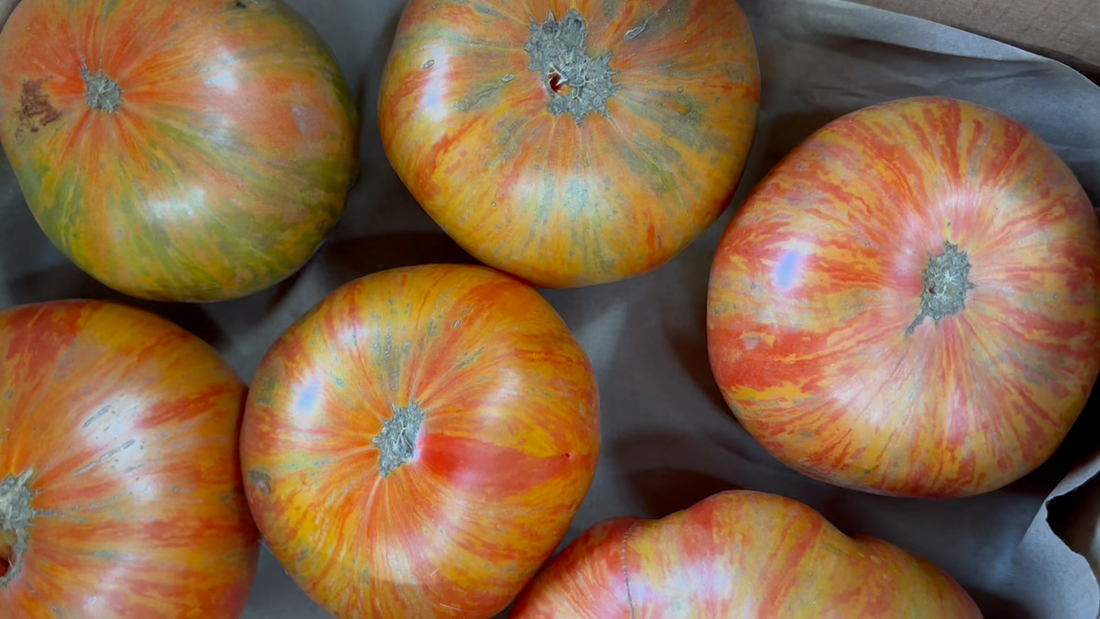I came to learn that the man in the ankle-length trench was Fred Hempel: farmer, Ph.D plant biologist, and tomato breeder. He was giving some of his seeds to Nigel to plant at the farm in Dixon. When Nigel explained this mysterious exchange, it only heightened my curiosity. I was a plant biology undergrad with my heart set on plant breeding and exactly no experience.
Tomatoes were the first twinkling fruits to really catch my eye. At the market, I became obsessed with varieties, with how the tomatoes were handled, and with how they were displayed. It’s funny, tomatoes occupy this in-between space – botanically a fruit, culturally and culinarily a vegetable – but they were my entry into fruit world, setting me on the path to become the humble fruit slinger I am now. Fred had no small part in that.

Fred's Benevento Tomato, grown by Spade & Plow Organics
Not long after that morning market encounter, Nigel and Lorraine Walker introduced me to Fred at an Eatwell Farm tomato dinner. I quickly made plans to visit him. I showed up on a warm Sunday morning in Sunol and followed Fred around as he excitedly talked about his cherry tomatoes varieties: the Bumble Bees, Pink Tigers, and Blushes. The colors were amazing, subtle streaks of reds, greens, yellows, and oranges marbled across the skin. Walking quickly down the rows to keep up with Fred, I plucked tomatoes off the plants – they were so tasty, too! I learned that Fred bred his tomatoes for flavor first.
Of course, as with any good breeder, he cared about other traits too, like shelf-life, production, and plant vigor. But I was convinced that Fred was flavor-first when he included tasting notes for every stage of tomato development: when it was underripe, perfectly ripe, or after some days in storage. One thing he tried to convince me of that we disagreed on was the flavor of a tomato picked half green and stored until fully colored had no flavor difference then one that was picked fully ripe on the vine. He basically called bullshit on “vine-ripened tomatoes.”

Fred's tomatoes: Benevento, Amalfi Orange, Marzano Fire, and Blush, clockwise from top left
Fred farmed and bred tomatoes on six acres at Baia Nicchia Farm (later renamed Green Bee Farm) in Sunol. He grew other things, too, like squash, peppers, and edible flowers. He partnered with other farmers throughout California and Mexico to grow out his tomato varieties, testing them in different climates and regions. And he worked closely with chefs around the Bay Area, a feedback loop that only reinforced the focus on flavor.
Fred passed away unexpectedly in October of last year, but he lives on through the tomatoes he developed and the community that sprung up around them. There’s a new generation of farmers growing the tomatoes that Fred devoted much of his life to. Eric and Andrew Walker of Farmboy Organics in Winters are growing several varieties of the Bumble Bee and Blush lines for their mixed cherry tomatoes. Father and sons trio Mike, Nick, and Sam of Spade & Plow in San Martin are growing Fred’s stunning sauce tomato, the Marzano Fire, as well as hearty beefsteaks like the Amalfi Orange and Benevento.
How cool to see his legacy growing through the work of young farmers! I feel honored to be able to offer these gems and share just a little of Fred’s story. Tomatoes were the first fruit that sparked my interest in farming, and I have Nigel Walker and Fred Hempel to thank for that.
-Joyce.





